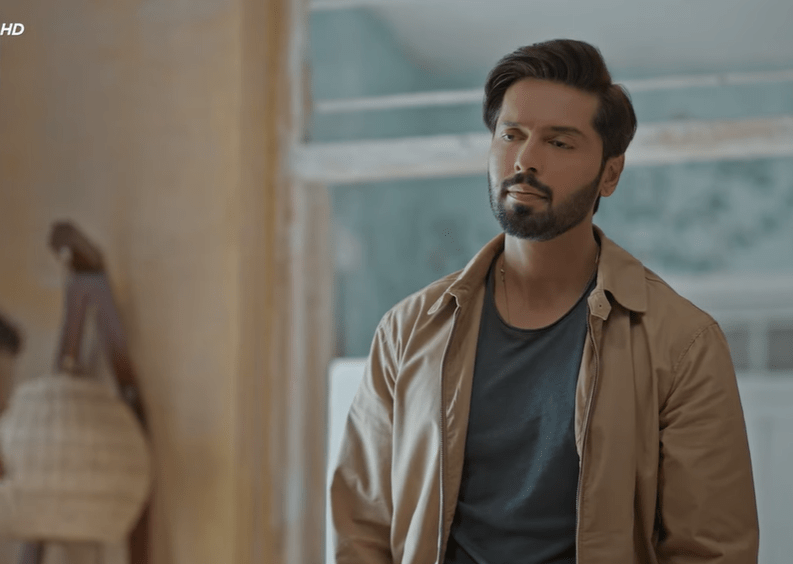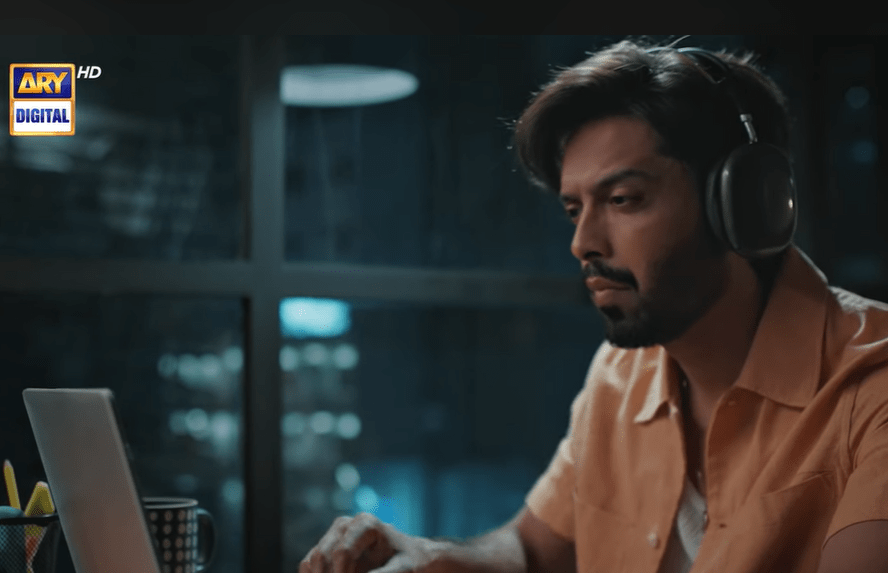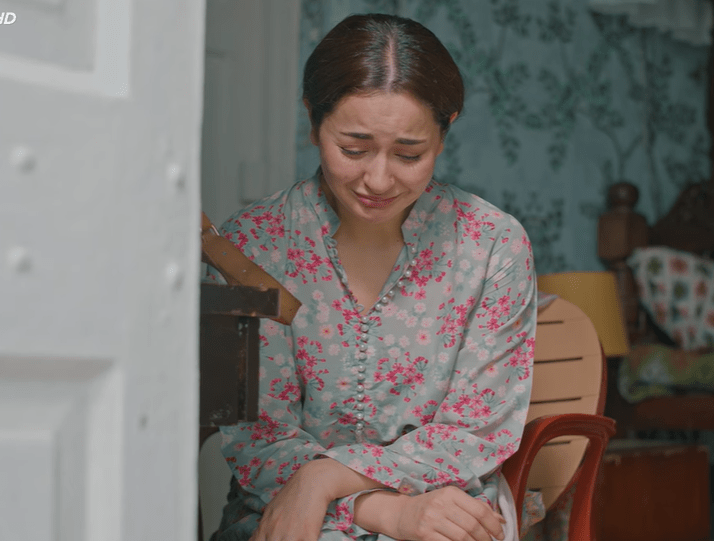A compelling story of Sharjeena and Mustafa, highlighting how work stress, financial instability, and unfulfilled ambitions impact their relationship, revealing the fragility of love under pressure.
1. Conflicts in the Workplace
The episode begins with a subtlety of tension as there is between Rubab and her husband Adeel, she is the CEO of their company. As the company has incurred financial losses, she has decided to run an internal audit and feels that Adeel’s people have been involved in some wrongdoing. Although Adeel agrees to cooperate, the mindset of Rubab indicates a lack of faith, suggesting that she might hold him responsible for all this financial stress. More than that, the audit will not only potentially threaten to close down the operations of the company with the risks of delays in the projects and delayed payments but also hint at deeper marital conflicts.

2. Personal Conflicts and Misconceptions between Sharjeena and Mustafa
Sharjeena’s husband accompanies her to a doctor’s appointment, which is a gesture to be with her at this stressful time of personal and professional strain. However, the absence of Mustafa for an extended time, neglecting to be there on a crucial business meeting, calls for loyalty and commitment from him. Sharjeena, in the end, goes to the appointment alone, which leads to a debate about trust issues and miscommunication in their relationship.


3. Health Problems and Sharjeena’s Pregnancy
Sharjeena’s visit to a doctor results in serious health problems when she suffers from extreme high blood pressure due to which even the life of her baby is at danger. The doctor’s advice to keep on staying in a happy and tension-free atmosphere indicates that amidst work pressures, health should come first. Even though a plot twist occurs in the story because Mustafa is under financial pressure, still, tension falls on the health of Sharjeena to be dealt with as the utmost concern for personal well-being.
4. Tension within the Family and Betrayal
However, things worsen when Adeel is confronted with the fact that his mother made a unilateral decision to sell their family house without consulting him, the work that pertains to him as well. These emotions of betrayal and despair are actually reflective of the stress caused by bad communication within families. Adding to that sense of frustration, even a lack of accountability catches up with Adeel, emphasizing how familial bonds can fray under pressure. This was the brief reminder of the complex game of trust among family relationships with Adeel and his mother. Hasty decisions create lineaments that may never again be reduced to usual grooves.

5. Relationship Issues between sharjeena and Mustafa
The burden of responsibilities weighed upon them both, and their inability to communicate proved to be the pronounced characteristic of Sharjeena and Mustafa. Misunderstandings begin to spin into accusations, as Mustafa, getting panicky at the prospect of responsibility, goes on to describe Sharjeena’s need for support as a burden. He alienates and does not hear out Rubab. The distance begins to grow between them. The chapter is so very true to couples in life-changing situations: the stress of attaining parenthood often makes issues worse, and creates a chasm emotionally.
6. Mustafa’s frustration
Mustafa was getting troubled due to his working stress, which made him irritated and frustrated all the time, as he felt that his game was not being marketed the way it should be marketed. Financial instability has a lot to weigh over their relationship, as heated arguments frequently follow them. Sharjeena tries her best to de-escalate the tension by urging the family to take breaks, but Mustafa’s frustration leads to an unwelcoming environment at home. This plot line reflects how pressures from outside can penetrate personal relationships, which depicts how easily love can shatter in adversity.

7. Stress on Personal Lives
The conflicts of Adeel and Rubab versus Sharjeena and Mustafa’s rivalry show how professional or financial stress connects itself to the personal life. Adeel’s obsession with success brings on an atmosphere of permanent stress, though Sharjeena still does her best to cope with Mustafa’s desperation to die because he had no future. This section of the novel highlights the difficulty of achieving the perfect work-life balance in that the insecurities of career ambitions can easily weigh on personal lives. The story demonstrates the fact that if people do not communicate their problems with each other and try to face their pressures alone, they might suffer from mental exhaustion due to stress.
8. Politics in Office and Trust Deficit
As tensions build up, the leadership styles of both Rubab and Adeel are called into question at the workplace. S/he would notice that a dramatic change has occurred in the way Rubab behaves and serious doubt begins to creep in about her decision-making authority as much as capability. On the other hand, being left out of some items in a meeting agenda brings unwarranted doubts as to the loyalty and trust of some team members about Adeel. This unfriendly workplace atmosphere complicates their working together, and the issues they face gain momentum in both their personal and professional lives.

9. Unintentional Virality
During all this mess, the game Mustafa created just so happens to go viral when one of the biggest influencers shares it. This can also bring more downloads and a rekindling of public interest in their company as well, an oasis in the desert. This success was so unanticipated that it may be a turning point, hinting that sometimes adversity breeds opportunity that an individual never counted on. And to boot, it gives them some leeway from what is stressing them out at any one time, and the couple can enjoy this momentary win, reaffirming the importance of this relationship in this windfall.

10. Personal Sacrifices and Long Term Planning
Natasha becomes an added complexity in the plot for Adeel. When Adeel goes for counseling and wants to clear up things with his wife, Rubab, he keeps distance from Natasha to balance out his personal desires with his sense of familial responsibility. This strain defines the paradoxical state of individual desire and obligation and illustrates how difficult it can be to balance between love and duty. One can understand how difficult it is for one person to find a balance between love and duty through Adeel’s inner conflict, reminding that sacrifice is one ideal thing for commitment and how outside forces shape one’s personal bonds.
11. Conclusion
The play is a poignant study into the conflicting demands of personal life and professional obligation. Conflicts between Adeel and Rubab magnify the need for communication, trust, and teamwork during tough times especially when the child would soon arrive. But in this story, the narrative shows that mutual understanding is significant to help conquer life’s hardships, after Sharjeena and Mustafa’s journey ensued. Ultimately, that there would be “success in surprising ways; sometimes one could feel how much grit was needed to swim through the turbulent waters of life”. It serves as a reminder that adversity tests relationships and yet also provides the impetus for growth, connection, and hope.
